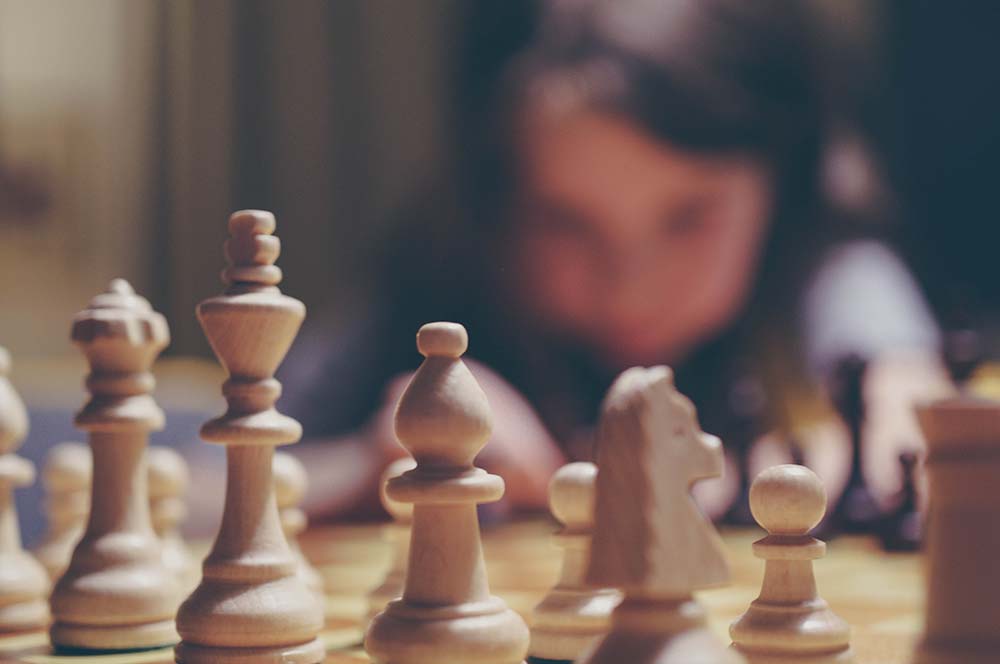Top six brain benefits of playing chess
Did you know that playing chess has been proven to benefit your creativity, concentration and even stimulate new gray matter growth?

Top six brain benefits of playing chess
Are you a chess lover? Chess curious? Or perhaps a little intimidated by the game?
Chess has a rep of “pastime for the brainy”, just like yoga is often seen as a hobby for the most bendy. The truth is, just like yoga stretches us to get more flexible, playing chess can help the old and young alike to flex their neural pathways and develop their brains!
And whether we play for fun or aim for mastery, there are many brain benefits to reap. Better still, these benefits are often transferable to real life, too.
Another perk of this classic strategy game is that you can play it wherever you are: if you haven’t got a board, it’s easy to set up a game with a few taps on an online platform like Squiggle.
So whether you’re already a keen player or someone who’s never gotten around to having a go at “the game of kings”, read on to find out the top six ways chess is good for your brain.
1. Boost your ability to focus
Picture a chess player in your mind - did you conjure an image of someone with a look of intense concentration on their face as they ponder their next move? Anya Taylor-Joy moving in for the kill as chess prodigy Beth Harmon in The Queen’s Gambit?
If only the kids were that focused while tackling their homework!
Come to think of it, if only us adults were that good at blocking out pesky distractions and intruding thoughts while working… As it happens, spending time playing chess may be the next best thing to being naturally good at concentrating.
It’s a game that rewards those who learn to maintain their focus on the task at hand, so sitting down for a match every now and then can actually train your brain to become more disciplined and attentive.
Plus chess is a fun pastime, so inviting your kids to play a game of chess shouldn’t pose too much of a challenge.
And who knows, maybe homework will go down better after a game.
It’s worth a try, right?!
2. Strengthen your memory
Do you ever find yourself wondering where you left your phone - again? Or maybe it’s the kids who never seem to remember where they put their favorite toy?
Playing chess may not actually stop us from misplacing our stuff (we’re still waiting for that study), but there’s evidence that it can improve memory in other ways, such as making players better at recalling visual patterns and spoken words.
And no wonder - with so much you can memorize from rules and tactics to positions and move combinations - chess is bound to have a positive effect on our memory.
If your kids have outgrown card matching games, give them (and yourself) the gift of improved memory by bringing out the chess board and hosting a family chess tournament.
3. Hone your problem-solving skills
It may be a long way off (and hard to imagine at times!), but one day our children will leave the nest and lead independent lives.
One of our top jobs as parents is to equip them with the skills to solve problems and make sensible decisions before they take that leap. And we could do much worse than encourage our kids to try their hand at chess.
Why? By playing chess, we practice thinking like a chess player.
That is, we learn to take our time to plan ahead and consider our options carefully, weigh the pros and cons before jumping into action and adapting our game plan every time our opponent makes an unexpected move.
As the ultimate strategy game, chess is like a low-stakes simulation of real-life problem solving. Practice makes perfect, as the saying goes, and the chess board is a risk-free place for our young ones to get better at learning from their mistakes and planning ahead.
4. Ignite your creativity
The world is always in need of creative out-of-the-box thinkers and innovators. For individuals and humanity alike, breakthroughs tend to happen when we dare to step off the well-trodden path to try something new and original.
So what can we do to foster creative thinking in our children? You guessed it: play chess with them!
In chess, making one predictable move after another is a sure-fire way to quickly lose a game. Therefore, chess encourages us to constantly think of new ways to throw our opponent off with an original move or tactic.
But is there evidence that chess actually enhances creativity outside the game or is it just wishful thinking?
There are studies that measured a real difference. In one study, researchers showed that when asked to think of novel ways to use familiar objects, children who’d been playing chess came up with more suggestions.
5. Make your brain more efficient
Another brain-boosting perk of taking up chess as a hobby is that it can stimulate new gray matter growth. Specifically, the mental challenges posed by strategy games like chess promote the formation of new dendrites. These are branch-like structures that connect neurons and carry signals between them (think networks of brain-power-carrying telephone wires).
More connections means speedier and more efficient processing of information in the brain.
The complexity of chess also means that it stimulates both hemispheres of the brain, giving it something akin to a full-body workout.
Not bad for a board game that’s been around for centuries!
6. Protect your brain
By now we’ve seen that playing chess is a powerful way to boost our brain power. But it turns out it can also protect what we’ve already got. We’ve all heard the rule ‘use it or lose it’ and this also applies to brain health, too. In particular, research shows that engaging in mentally stimulating hobbies like chess helps the mind stay sharp in our golden years and may even have a protective effect against the development of dementia.
So, if you’re looking for a new hobby to take up with your kids, chess is a fab choice. Why not get Grandma and Grandad in on the action too? Playing a game with the grandkids either face-to-face or on a video call is a fun way to connect and create memories together - the brain benefits are just a bonus!
If you liked this post and want more inspiration, tips and updates from Squiggle just hit ‘Like’ on our Squiggle Facebook page and follow us on Twitter and Instagram. You can also sign up to our regular newsletter in the footer below.
Or if you’d like to play chess (or draughts) with Squiggle then read all about it here: How to play chess in a Squiggle video call.
Studies
- The Effect Of Playing Chess On Focused Attention
- https://www.researchgate.net/publication/331153773_The_Effect_Of_Playing_Chess_On_Focused_Attention
- Auditory memory function in expert chess players
- https://www.ncbi.nlm.nih.gov/labs/pmc/articles/PMC4715404/
- Chess knowledge predicts chess memory even after controlling for chess experience
- https://pubmed.ncbi.nlm.nih.gov/29101550/
- Planning abilities and chess
- https://pubmed.ncbi.nlm.nih.gov/16848944/
- A study on the impact of chess training on creativity of Indian school children
- https://www.semanticscholar.org/paper/A-Study-on-the-Impact-of-Chess-Training-on-of-Joseph-Manoharan/4b13f637908b48e654044b4beec0fd336abbb6fb
- Chess practice as a protective factor in dementia
- https://www.mdpi.com/1660-4601/16/12/2116
Photo by Michał Parzuchowski on Unsplash
